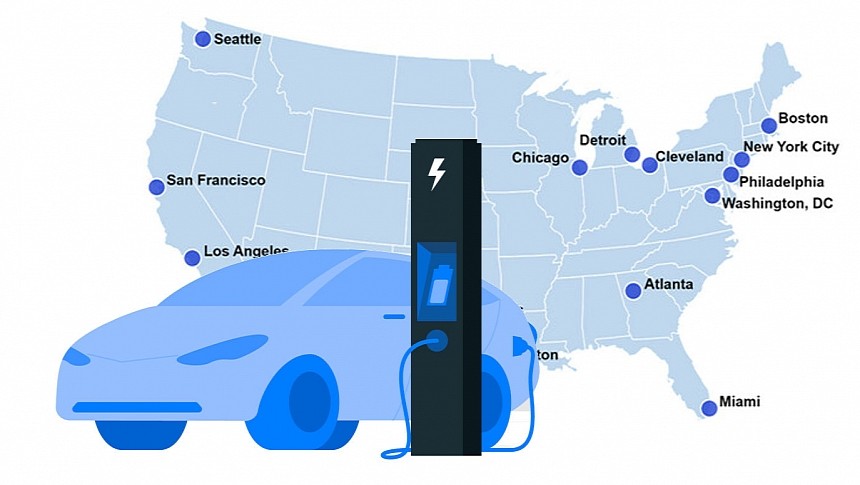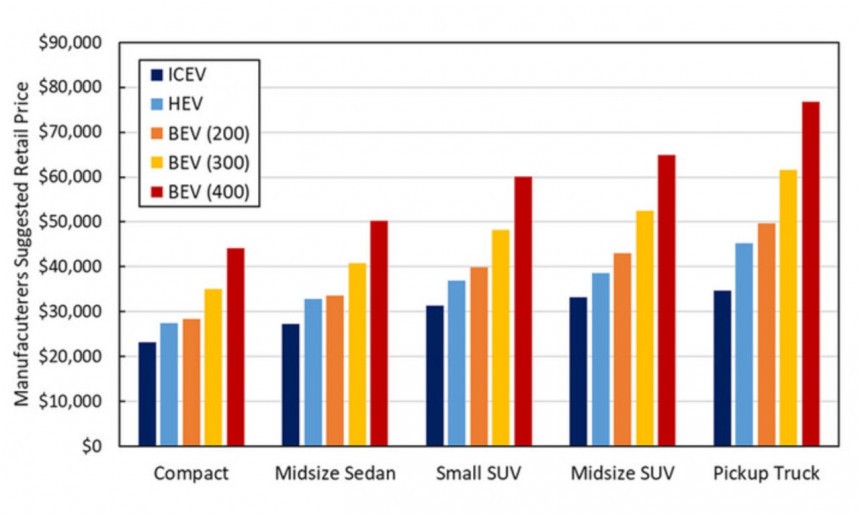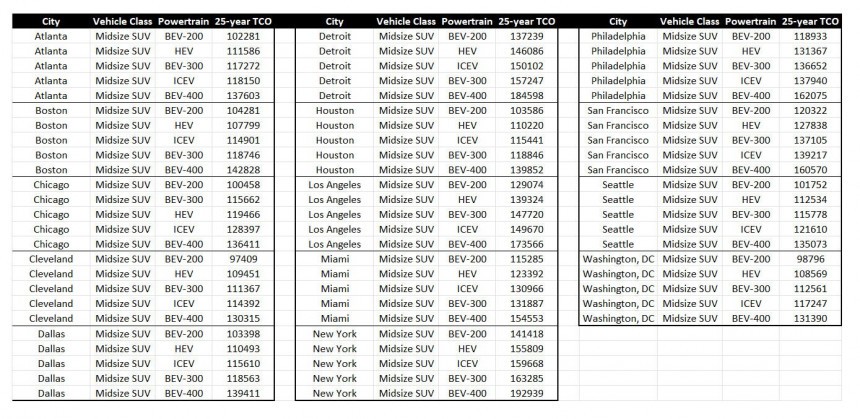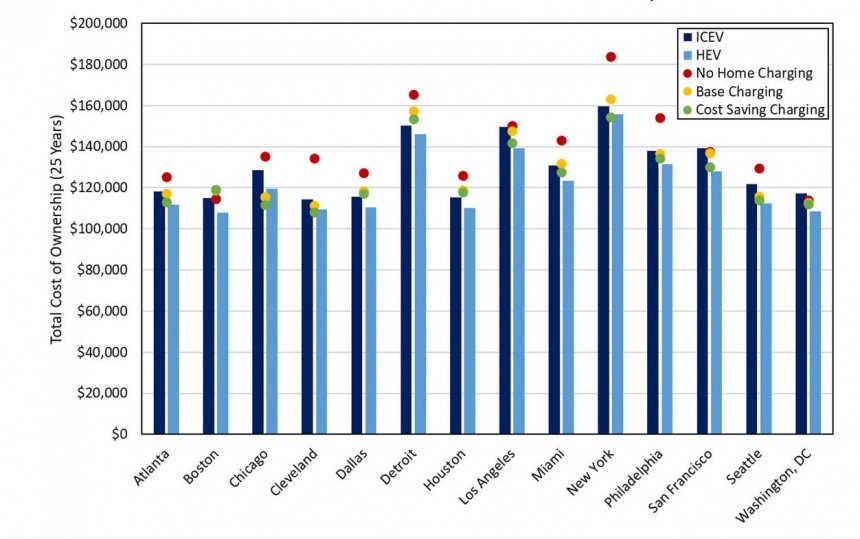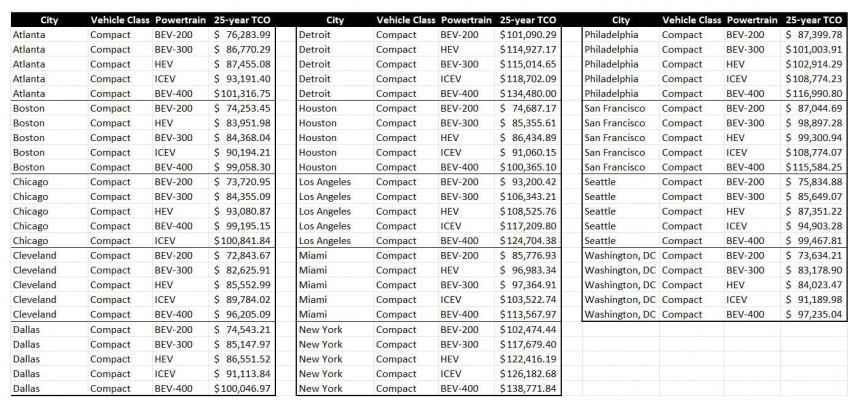It's not the first study of this kind, but the news is that researchers calculated the TCO specifically for 14 American cities. So, if you're a resident in one of these cities, you can make a more informed decision on buying a new electric car, a hybrid one, or an internal combustion engine one. That is if you're interested in more than just the upfront cost of your new vehicle.
First things first: would you happen to care about transportation decarbonization? If your answer is, "Hell, no, I only care about making America great again, helping the sales of ICE vehicles and the oil, gas, and coal industry because climate change is a hoax," then you're in the wrong neighborhood, pal. Just move along; don't waste any time on this article.
However, suppose you are aware that almost a third of greenhouse gas emissions in the United States come from the transportation sector, and more than half of it is because of LDVs (light-duty vehicles, like the one you're probably driving every day). In that case, you'll probably want to stick around and find out more.
Especially if you live in Atlanta, Boston, Chicago, Cleveland, Dallas, Detroit, Houston, Los Angeles, Miami, Manhattan, Philadelphia, San Francisco, Seattle, or Washington DC, these are the cities this study focuses on, as they represent major vehicle markets.
The study takes into account a large number of factors, starting with financial ones (price, taxes, insurance, maintenance, and so on) and continuing to local gasoline prices and electricity plans or the impact of temperatures and drive cycles on fuel economy and range, or even use pattern and vehicle miles traveled.
So, it's more than any college kid could do using simple math formulas. In fact, the results vary significantly from city to city, and, believe it or not, it's not always in favor of electric cars. For instance, small and low-range EVs are generally less expensive than their gasoline counterparts, while larger and long-range EVs are not.
By the way, this year, the EV tax credit is easier to get, but there are fewer eligible EVs, and also, there are more constraints related to the annual income of potential customers. It looks like those electrification goals will be harder to achieve. That's why this study's findings are beneficial for customers and policymakers.
By now, you know that price, range, and charging are the "Holly Trinity" against EV adoption. Pricing, including all the other costs associated with using a car, is the most critical concern because today, transportation costs and vehicle ownership represent, on average, 16% of household expenditures in the US. It's the second burden for a family's budget after housing.
So, how much do you pay for your car? According to many researchers, customers usually underestimate these costs by a whopping 50%! That's why the TCO is no longer a crucial tool for companies only but should become a pillar for private persons' buying decisions.
This study brings some essential novelties. For instance, some TCO studies compare best-selling vehicles for their segments and powertrains. At the same time, Argonne National Laboratory's BEAN model uses hypothetical vehicles with similar performance parameters based on physics-based models.
These approaches are ok for large-scale analysis, but they are far from being really useful to regular customers because they lack a lot of accurate data and parameters. That's why this study considers five categories of cars (compact cars, midsize sedans, small SUVs, midsize SUVs, and pickup trucks) and five types of powertrains (gasoline engines, hybrid powertrains, and three maximum range battery electric vehicles).
Because the average age of passenger vehicles in the US is 12.5 years, according to research firm S&P Global Mobility, most TCO calculations consider 12-15 years for a vehicle's average lifetime. However, in this study, the ownership period is 25 years, corresponding to a mileage of 250,000 miles.
This is a more realistic approach as the national fleet of more than 280 million vehicles is getting older yearly. It also impacts the end-of-life costs differently, which changes the "resale value" paradigm (used broadly in trade-in businesses) into the scrappage value of the vehicle. Of course, thanks to its battery, an electric car has an edge over gasoline.
For every TCO study, the initial costs include the vehicle's purchase price, taxes, and fees. That's where EV incentives are the most significant for making electric vehicle prices competitive to hybrid and gasoline ones. However, this study includes home charging equipment and installation costs, which obviously affect an EV's subsidized price advantage.
This study adds many other factors to its calculations, but the bottom line is that you can be sure it's a comprehensive study, and you have all the reasons to trust its findings. Whether you like it or not – as an electrohead, I'm not too happy about some of its conclusions. But, hey, it's a study funded by the Responsible Battery Coalition, not by Exxon…
For a midsize SUV, which is the best-selling type of passenger car in the US nowadays, for different powertrains, the 25-year TCO varies like this:
- MSRP $33,000, gasoline engine: $114,000 to $160,000 (345% to 484% from the MSRP price)
- MSRP $39,000, hybrid powertrain: $108,000 to $156,000 (276% to 400% from the MSRP price)
- MSRP $43,000, 200-mile battery: $97,000 to $141,000 (225% to 328% from the MSRP price)
- MSRP $52,000, 300-mile battery: $111,000 to $163,000 (213% to 313% from the MSRP price)
- MSRP $65,000, 400-mile battery: $130,000 to $193,000 (200% to 297% from the MSRP price)
It may surprise that the TCO is two to almost fivefold higher than the MSRP price over 25 years. You should also note the significant variations of the TCO, depending on each city's conditions.
Addressing the promise in this article's title, you should know that, for this particular example, Cleveland and DC are the least expensive for a 200-mile battery electric midsize SUV. Frankly, I'm surprised that Los Angeles and San Francisco, from California, aka "the country of EVs," are among the cities with the most expensive 25-year TCOs, just after New York and gas-guzzling lover Detroit.
Surprisingly, in most cities, a hybrid midsize SUV has a better 25-year TCO than a 300-mile battery electric midsize SUV. For instance, in Boston, the difference is almost $11,000 in favor of the hybrid variant, while in Washington DC, the difference is only $4,000, and in Cleveland, less than $2,000.
The best 25-year TCOs for gasoline midsize SUVs are in… Cleveland and Boston, which fare better than Houston or Detroit. If you're in for a 400-mile battery electric midsize SUV, you'll find the best 25-year TCOs in Cleveland and Washington DC.
Sorry, New Yorkers, but it seems this is the most expensive city for all powertrains. Here, the TCO for a 400-mile battery electric midsize SUV is around 50% higher than in Cleveland, and that of a gasoline SUV is almost the same as a 400-mile SUV in San Francisco.
A very interesting topic is how recurring costs are divided into the main components: fuel/electricity, repairs, maintenance, insurance, annual fees, and financing. Let's take the case of the same medium SUV but with only three powertrains: a gasoline engine, hybrid propulsion, and a 300-mile battery.
A common trait is the higher EV variant costs for financing and insurance (because of a higher initial price) and also its lower costs for maintenance, repairs, and charging. That's why, in most cases, the EV variant has lower recurrent costs than the gasoline variant, while in a few instances, the hybrid variant is the best.
You should also be aware that these recurring costs vary over time. For instance, the financing costs are usually comprised in the first six years, while the maintenance and repairs costs are low in the first years and then increase. This is especially true for gasoline and hybrid variants because of the specific needs of internal combustion engines over time.
A key finding of this study emphasizes the importance of home charging. On average, users who charge at home halve the costs compared to using public networks – in Cleveland, charging at a public station is almost four times more expensive than charging at home!
In the example of the 300-mile battery electric midsize SUV, charging at home can reduce the 25-year TCO by $10,000 on average and up to $26,000 in some cities like Cleveland or New York. Authors of this study urge policymakers and carmakers to make more efforts to make home charging much more accessible, as this can significantly contribute to cost parity and EV adoption.
Those interested in other vehicle classes can do the same calculations using the table values from this study. I'll give you a hint: the most important conclusion of this study (if not the most important) is that low-range EVs are more affordable than similar gasoline vehicles, even without subsidies.
Let me emphasize the "even without subsidies." From a TCO perspective, small electric vehicles are already better than gasoline cars. This is the case regardless of the city you live in. Of course, many could argue that because of "range anxiety," the hybrid variants are better.
However, the 25-year TCO of a hybrid compact car is clearly higher than a comparable 200-mile battery electric compact vehicle. Moreover, for many of the cities in this study, the hybrid variant's TCO is the same or even higher than the 300-mile EV option.
This study is far from perfect, but I find it to be the most comprehensive to date on the subject of the TCO for new vehicles. Future works should also consider other costs for the "expanded TCO," such as social costs, time value for owners, alternative transportation costs, etc.
For now, it's clear that the trend for larger SUVs and pickup trucks is colliding with the goal of rapid decarbonization of road transport. Today, the TCO for large-batteries long-range EVs is hardly competitive compared to their hybrid and gasoline counterparts. I hope it's not too late to stop the insane "mine is bigger" race in the car industry.
However, suppose you are aware that almost a third of greenhouse gas emissions in the United States come from the transportation sector, and more than half of it is because of LDVs (light-duty vehicles, like the one you're probably driving every day). In that case, you'll probably want to stick around and find out more.
Especially if you live in Atlanta, Boston, Chicago, Cleveland, Dallas, Detroit, Houston, Los Angeles, Miami, Manhattan, Philadelphia, San Francisco, Seattle, or Washington DC, these are the cities this study focuses on, as they represent major vehicle markets.
So, it's more than any college kid could do using simple math formulas. In fact, the results vary significantly from city to city, and, believe it or not, it's not always in favor of electric cars. For instance, small and low-range EVs are generally less expensive than their gasoline counterparts, while larger and long-range EVs are not.
Everybody knows EVs are (still) expensive. But are they costly?
I should point out the context: the United States government wants 50% of the new cars to be fully electric by 2030, while many states have already set more ambitious goals – like 100% EV sales by 2035. That's why you have tax credits of up to $7,500 in the Inflation Reduction Act.By the way, this year, the EV tax credit is easier to get, but there are fewer eligible EVs, and also, there are more constraints related to the annual income of potential customers. It looks like those electrification goals will be harder to achieve. That's why this study's findings are beneficial for customers and policymakers.
By now, you know that price, range, and charging are the "Holly Trinity" against EV adoption. Pricing, including all the other costs associated with using a car, is the most critical concern because today, transportation costs and vehicle ownership represent, on average, 16% of household expenditures in the US. It's the second burden for a family's budget after housing.
So, how much do you pay for your car? According to many researchers, customers usually underestimate these costs by a whopping 50%! That's why the TCO is no longer a crucial tool for companies only but should become a pillar for private persons' buying decisions.
This study brings some essential novelties. For instance, some TCO studies compare best-selling vehicles for their segments and powertrains. At the same time, Argonne National Laboratory's BEAN model uses hypothetical vehicles with similar performance parameters based on physics-based models.
These approaches are ok for large-scale analysis, but they are far from being really useful to regular customers because they lack a lot of accurate data and parameters. That's why this study considers five categories of cars (compact cars, midsize sedans, small SUVs, midsize SUVs, and pickup trucks) and five types of powertrains (gasoline engines, hybrid powertrains, and three maximum range battery electric vehicles).
This is a more realistic approach as the national fleet of more than 280 million vehicles is getting older yearly. It also impacts the end-of-life costs differently, which changes the "resale value" paradigm (used broadly in trade-in businesses) into the scrappage value of the vehicle. Of course, thanks to its battery, an electric car has an edge over gasoline.
For every TCO study, the initial costs include the vehicle's purchase price, taxes, and fees. That's where EV incentives are the most significant for making electric vehicle prices competitive to hybrid and gasoline ones. However, this study includes home charging equipment and installation costs, which obviously affect an EV's subsidized price advantage.
This study adds many other factors to its calculations, but the bottom line is that you can be sure it's a comprehensive study, and you have all the reasons to trust its findings. Whether you like it or not – as an electrohead, I'm not too happy about some of its conclusions. But, hey, it's a study funded by the Responsible Battery Coalition, not by Exxon…
The Total Cost of Ownership is more important than you thought
Considering the manufacturer's suggested retail price, it's evident that big-batteries long-range electric cars are simply very expensive compared to their gasoline or hybrid counterparts across all the vehicle categories considered in this study. This image is the best excuse for EV naysayers, isn't it?- MSRP $33,000, gasoline engine: $114,000 to $160,000 (345% to 484% from the MSRP price)
- MSRP $39,000, hybrid powertrain: $108,000 to $156,000 (276% to 400% from the MSRP price)
- MSRP $43,000, 200-mile battery: $97,000 to $141,000 (225% to 328% from the MSRP price)
- MSRP $52,000, 300-mile battery: $111,000 to $163,000 (213% to 313% from the MSRP price)
- MSRP $65,000, 400-mile battery: $130,000 to $193,000 (200% to 297% from the MSRP price)
It may surprise that the TCO is two to almost fivefold higher than the MSRP price over 25 years. You should also note the significant variations of the TCO, depending on each city's conditions.
Addressing the promise in this article's title, you should know that, for this particular example, Cleveland and DC are the least expensive for a 200-mile battery electric midsize SUV. Frankly, I'm surprised that Los Angeles and San Francisco, from California, aka "the country of EVs," are among the cities with the most expensive 25-year TCOs, just after New York and gas-guzzling lover Detroit.
Surprisingly, in most cities, a hybrid midsize SUV has a better 25-year TCO than a 300-mile battery electric midsize SUV. For instance, in Boston, the difference is almost $11,000 in favor of the hybrid variant, while in Washington DC, the difference is only $4,000, and in Cleveland, less than $2,000.
The best 25-year TCOs for gasoline midsize SUVs are in… Cleveland and Boston, which fare better than Houston or Detroit. If you're in for a 400-mile battery electric midsize SUV, you'll find the best 25-year TCOs in Cleveland and Washington DC.
Sorry, New Yorkers, but it seems this is the most expensive city for all powertrains. Here, the TCO for a 400-mile battery electric midsize SUV is around 50% higher than in Cleveland, and that of a gasoline SUV is almost the same as a 400-mile SUV in San Francisco.
A common trait is the higher EV variant costs for financing and insurance (because of a higher initial price) and also its lower costs for maintenance, repairs, and charging. That's why, in most cases, the EV variant has lower recurrent costs than the gasoline variant, while in a few instances, the hybrid variant is the best.
You should also be aware that these recurring costs vary over time. For instance, the financing costs are usually comprised in the first six years, while the maintenance and repairs costs are low in the first years and then increase. This is especially true for gasoline and hybrid variants because of the specific needs of internal combustion engines over time.
In the example of the 300-mile battery electric midsize SUV, charging at home can reduce the 25-year TCO by $10,000 on average and up to $26,000 in some cities like Cleveland or New York. Authors of this study urge policymakers and carmakers to make more efforts to make home charging much more accessible, as this can significantly contribute to cost parity and EV adoption.
Let me emphasize the "even without subsidies." From a TCO perspective, small electric vehicles are already better than gasoline cars. This is the case regardless of the city you live in. Of course, many could argue that because of "range anxiety," the hybrid variants are better.
However, the 25-year TCO of a hybrid compact car is clearly higher than a comparable 200-mile battery electric compact vehicle. Moreover, for many of the cities in this study, the hybrid variant's TCO is the same or even higher than the 300-mile EV option.
For now, it's clear that the trend for larger SUVs and pickup trucks is colliding with the goal of rapid decarbonization of road transport. Today, the TCO for large-batteries long-range EVs is hardly competitive compared to their hybrid and gasoline counterparts. I hope it's not too late to stop the insane "mine is bigger" race in the car industry.
